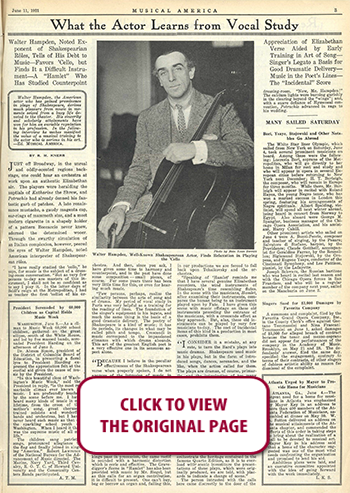 100 YEARS AGO IN MUSICAL AMERICA (398)
100 YEARS AGO IN MUSICAL AMERICA (398)
June 11, 1921
Page 3
What the Actor Learns from Vocal Study
Walter Hampden, Noted Exponent of Shakespearian Rôles, Tells of His Debt to Music—Favors ‘Cello, but Finds It a Difficult Instrument—A “Hamlet” Who Has Studied Counterpoint—Appreciation of Elizabethan Verse Aided by Early Training in Art of Song—Singer’s Legato a Basis for Good Dramatic Delivery—Music in the Poet’s Lines—The “Incidental” Score
Walter Hampden, the American actor who has gained promin~J —Ed. MUSICAL AMERICA.
BY R. M. KNERR
JUST off Broadway, in the unreal and oddly-scented regions backstage, one could hear an orchestra at work upon an authentic Elizabethan air. The players were heralding the nuptials of Katharine the Shrew, and Petruchio had already donned his fantastic garb of patches. A late renaissance mustache, a gaudy magenta cap, ear-rings of mammoth size, and a most modern cigarette in a shapely holder. of a pattern Boccaccio never knew, adorned the determined wooer. Through the swarthy simulation of an Italian complexion, however, peered the eyes of Walter Hampden, noted American interpreter of Shakespearean rôles.
“I have really studied the ‘cello,” he says, for music is the subject of a dressing-room conversation. “But as very few persons to-day are masters of this instrument, I shall not be so confident as to say I play it. In the latter days of Seidl’s reign at the Metropolitan, I had as teacher the first ‘cellist of his orchestra. And then, since you ask I have given some time to harmony and counterpoint, and in the past have done some composition—small pieces, of course. For some years there has been very little time for this, or even for hearing much music.
“Few persons, perhaps, realize the similarity between the arts of song and of drama. My period of vocal study in Parts was very helpful as a training for the reading of lines. The foundation of the singer’s equipment is his legato and much the same thing is the basis of a good dramatic delivery. The poetry of Shakespeare is a kind of music; it has its periods, its changes in what may be called pitch and tempo. Crescendi in music correspond to the impassioned climaxes with which drama abounds. This art of the greatest English poet is a very effective one in its sensuous aspect alone.
“BECAUSE I believe in the peculiar effectiveness of the Shakespearean verse when properly spoken, I do not approve of the intrusion of music, in theatrical representations of these plays, beyond the strictest limitation of the term ‘incidental.’ In the Balcony Scene, for instance, a musical accompaniment could only serve to distract. Nor do I put on the scenes in ‘Macbeth’ in which the supernatural element is presented to any prolonged lugubrious measures; only the thunders and lightnings called for by the text are used. Trumpet calls with the character of motifs are used in the latter day to symbolize the sovereignty to which the titular character aspires. These were arranged by Louis Siegel, composer and pupil of Ysaye, and employ the ancient Danish modes, which are said to antedate most European melodic material. In ‘Macbeth’ also when the apparitions of the murdered kings pass in procession, the same motif is sounded with a harmonic distortion which is eerie and effective. The Gravedigger’s Scene in “Hamlet” has also been provided with music by Mr. Siegel, but as this calls for an organ contribution, it is difficult to present. One can’t buy, beg or borrow an organ and, failing this, in our productions we are forced to fall back upon Tchaikovsky and the orchestra.
“Speaking of ‘Hamlet’ reminds me that I have several genuine Elizabethan recorders, the wind instruments of Shakespeare’s time resembling flutes. In the scene with the musicians, Hamlet after examining their instruments, compares the human being to an instrument played upon by Fate. I have given this scene with music offstage on these old instruments preceding the entrance of the musicians, with a crescendo effect as they approach. But, alas, these old instruments can be played by very few musicians to-day. The cost of incidental items of this kind in a production in most cases, prohibits them.
“I CONSIDER it a mistake, at any rate, to turn the Bard’s plays into music dramas. Shakespeare used music in his plays, but in the form of introduced songs, dances, serenades, and the like, when the action called for them. The plays are dramas, of course, primarily, and the introduction of too many lyric bits would have weakened the sustained art of these histories of conflict. Contemporary writers for the stage used the literary form of the masque, examples of which are often of great poetic value in a lyric sense. But the material of ‘Hamlet’ is different from the stuff of a song-cycle: it is climactic, an organic growth—like the sonata, an artistic and involved whole. Indeed, one of the qualities that mark Shakespeare off from the other Elizabethan poets, including even Marlowe, is the subordination of action, pure plot, to the profound analysis of character. The greatest literary mind we have had was not concerned with incident primarily, much less with the evolution of a framework upon which to hang musical interpolations. I should say that it is as grave a mistake to over-orchestrate the heritage contained in the famous Quarto Edition, as it is to overload with scenic investiture the presentation of these plays, which were originally produced, we are told, with placards to indicate a change of scene.”
The person entrusted with the calls here came discreetly to the door of the dressing-room. “Now, Mr. Hampden!” The calcium lights were burning garishly in the clearing beyond the “wings”; and, with a suave defiance of Hymeneal convention, Petruchio advanced in rags to his wedding.




 RENT A PHOTO
RENT A PHOTO





